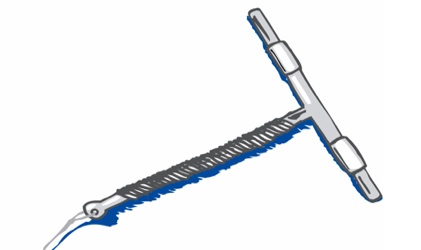 illus. of Paraguard IUD via Med.unc.edu
illus. of Paraguard IUD via Med.unc.edu
Last week, Dr. Vanessa Cullins, a board-certified obstetrician/gynecologist and vice president for medical affairs at Planned Parenthood® Federation of America, answered one reader’s question about the IUD and it’s safety. It sparked some debate in the comments, so she’s back this week to address those issues:
I think it is great that my answer has sparked such a rich discussion about IUDs. It’s fabulous when women share their experiences with birth control with each other — such discussions should be more widespread and occur more often. I thought I might join in and talk about a few of the things that have come up about IUDs.
Given the history of previous versions of the IUD, I understand why some are concerned about their safety, and IUDs are certainly not the only form of contraception that Planned Parenthood offers. And, as it turns out, credible medical research has found that modern IUDs are very safe. Of course, any medicine or medical device has the potential for risks or side effects, and that’s also true with IUDs — but serious side effects are rare and when they do happen, they are generally quite treatable. You can read about the rare potential serious problems with IUDs here.
It’s true that IUDs aren’t for everyone. Certain health problems and conditions may rule out using an IUD. We list those conditions on our website, and we review them with women who visit our health centers. And some women would just prefer using another method instead of an IUD. That’s OK — at Planned Parenthood, we encourage women to consider the benefits and disadvantages of all methods when deciding which one to use. We know that when a woman makes informed decisions and gets the contraceptive method that is most appropriate to her lifestyle, likes, dislikes, and health history, she’s most likely to use it consistently and correctly. And that’s the key to preventing pregnancy — using the birth control method of your choice consistently and correctly.
Luckily, there are many birth control options available to women. And I agree with you, Chingona and Jessi, every woman needs to talk to her health care provider, learn the pros and cons, and make her own informed and very beneficial decision for herself and her partner.
Best wishes for your good sexual health,
Vanessa
Planned Parenthood
Vanessa Cullins, MD, MPH, MBA, is a board-certified obstetrician/gynecologist and vice president for medical affairs at Planned Parenthood® Federation of America. To ask her your own question, click here.

















Any birth control method can have serious side effects. While have my paraguard inserted was quite a scary and incredibly painful experience, and I do have much heaver periods (but no extra cramping and the periods aren’t longer), I’m glad I waited to let things “settle” and see how the IUD felt for the long run. With no hormones, I feel much more balanced emotionally. The Pill, and even the Nuvaring, seemed to coincide with me feeling much more anxious all the time (over a period of years, not just a few months). And for me, the Nuvaring was quite large and would push out against my vaginal walls while running (even after trying to push it back up) – who needs that?
Based on my experience, your clinician should schedule a follow-up about a month after insertion of your IUD to make sure it’s sitting in the right place. And they should open up your cervix twice (ouch!): once to measure your cervix, and once to actually insert the paraguard.
I actually had pregnancy symptoms after getting the paraguard (very swollen breasts, pangs of nausea) to the point that my gynecologist was suspicious I WAS pregnant. since that’s not normal on a non-hormal IUD (never have been pregnant) 🙂 So they tested me to make sure and of course it came back negative. Just goes to show that the risk of pregnancy should be dramatically reduced if all of the “safety” checks are put in place and you have a very mindful clinician.
WELL I JUST HAD ONE DONE ON MARCH 23 2011 AND IT WAS A LIL PAIN AT FRIST AND THEN IT WENT AWAY BUT NOW EVERYTHING IS GUD NOW AND I REALLY LIKE IT I HAVE NOT HAD A PEORID YET AND IT DOES NOT MATTER IF I DONT BECA– USE I REALLY DONT WANT IT ANYWAY LIFE US SO MUCH BETTER WITHOUT ONE TRUST ME SO LADYS GET YOURS AND BE HAPPY
hi my name is Lidia i got the uid insert on March 8 2011 and my doctor told me not to have sex until the bleeding stop it did stop on Friday march 12 2011 and i have a sex with my partner on Sunday march 14 and i was bleeding is that bad and my period didn’t come yet what should i do ty
“And that’s the key to preventing pregnancy — using the birth control method of your choice consistently and correctly.”
That’s the thing bothering me about IUDs. It’s not the woman who uses the method ‘consistently and correctly’. She has to rely on her gyno for that and won’t know of mistakes until it’s to late.